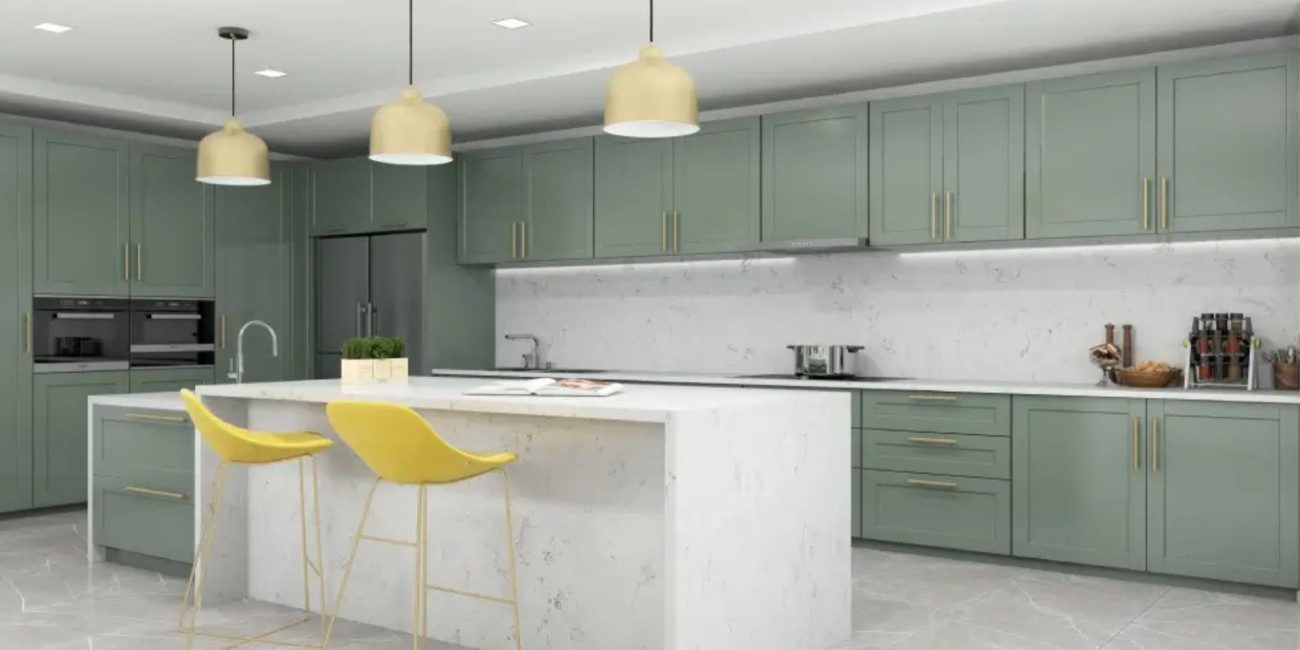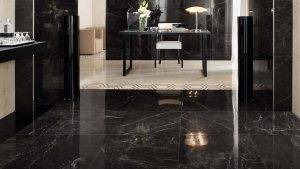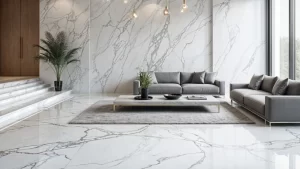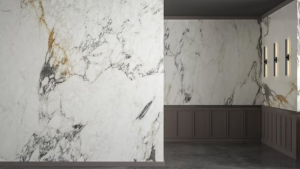How thick is a quartz countertop? If you’re planning a new kitchen or bathroom, this is one of the most common questions you’ll come across. Thickness matters because it affects not only the strength of your countertop but also the way it looks, feels, and fits into your space.
Quartz countertops are one of the most popular choices today. They are stylish, durable, and easy to maintain. But when it comes to thickness, not all quartz slabs are the same. Some are slim and sleek, while others are thick and bold. Knowing the difference will help you make the right choice for your home.
In this guide, we’ll cover everything you need to know — the standard thickness options, factors that affect your decision, cost comparisons, and the best choices for kitchens and bathrooms in Dubai and the UAE.
Understanding Quartz Countertops
Quartz countertops are engineered stone surfaces. They are made from:
- 90–95% crushed quartz crystals (one of the hardest natural minerals).
- 5–10% resins and pigments that bind the stone together and add colour.
The result is a non-porous, durable, and stylish surface. Unlike granite or marble, quartz is consistent in pattern and does not require sealing. This makes it perfect for busy kitchens and bathrooms.
If you’re exploring options, you’ll find many quartz countertops suppliers in Dubai and across the UAE offering different thicknesses and finishes.
Standard Thickness Options for Quartz Countertops
Quartz countertops usually come in three main thicknesses: 1 cm, 2 cm, and 3 cm. Each has its own pros and cons.
1 cm Quartz Slabs
- Usually used for vertical applications like wall cladding, backsplashes, or furniture tops.
- Too thin for kitchen countertops unless installed with strong support.
- Light and cost-effective, but not durable for heavy use.
2 cm Quartz Countertops
- A common option in many markets.
- Looks sleek and modern, especially in minimalist kitchens.
- Needs extra support, like plywood or a reinforced cabinet base.
- Often chosen for bathrooms or areas with lighter use.
3 cm Quartz Countertops
- The most popular thickness for kitchens.
- Strong, durable, and does not need additional support.
- Ideal for heavy-use areas like cooking spaces.
- Gives a bold, luxury appearance.
| Thickness | Best Use | Support Needed | Cost Level | Durability |
| 1 cm | Walls, backsplashes | Always | Low | Low |
| 2 cm | Bathrooms, light kitchens | Yes | Medium | Medium |
| 3 cm | Kitchens, heavy-use areas | No | Medium-High | High |
Factors to Consider When Choosing Thickness
When deciding how thick your quartz countertop should be, consider these key factors:
Durability & Strength
- Thicker slabs = more strength.
- A 3 cm slab resists cracks, chips, and pressure better than a 2 cm or 1 cm option.
Aesthetic Appeal
- Thin quartz (1–2 cm) creates a modern, minimal look.
- Thick quartz (3 cm) looks bold and luxurious.
Application & Usage
- Heavy-use kitchens → 3 cm is best.
- Bathrooms or decorative areas → 2 cm works fine.
- Wall cladding or furniture → 1 cm is suitable.
- 1 cm is the cheapest but not practical for kitchens.
- 2 cm is mid-range but requires extra support (which adds cost).
- 3 cm is pricier but more durable and long-lasting.
Quartz Countertops vs Other Materials (Thickness Perspective)
Budget & Cost
Thickness is not only about quartz. Let’s see how it compares to other common countertop materials.
Quartz vs Granite vs Marble (Thickness & Features)
| Feature | Quartz | Granite | Marble |
| Common Thickness | 2 cm / 3 cm | 2 cm / 3 cm | 2 cm / 3 cm |
| Durability | High | High | Medium |
| Porosity | Non-porous | Needs sealing | Very porous |
| Maintenance | Easy | Moderate | High |
| Appearance | Uniform, many colours | Natural, unique | Natural, elegant |
Key takeaway: Quartz offers the same thickness options as granite and marble, but with easier care and a wider design variety.
Quartz Countertop in Dubai: Local Preferences
In Dubai, quartz countertops are highly popular in both residential and commercial projects. Homeowners often choose:
- 3 cm slabs for luxury kitchens.
- 2 cm slabs for bathrooms and vanities.
- Wide colour selection that matches modern and classic interiors.
Choosing a quartz countertop in Dubai also ensures you get professional installation and access to premium designs that elevate your space.
Working With a Quartz Supplier in the UAE
If you’re in the UAE, it’s always best to work with a trusted supplier.
Benefits of choosing a local quartz supplier in the UAE:
- Access to a wide range of thicknesses (1 cm, 2 cm, 3 cm).
- Professional installation services.
- Better after-sales support and warranty.
- Cost savings when buying wholesale.
Quartz Countertops Cost Guide (by Thickness)
The cost of quartz countertops depends largely on thickness.
Approximate Cost by Thickness (per sq. ft.)
| Thickness | Average Cost | Best Use |
| 1 cm | Low (budget option) | Walls, furniture, backsplashes |
| 2 cm | Medium | Bathrooms, light-use kitchens |
| 3 cm | Higher | Heavy-use kitchens, luxury homes |
Note: Prices vary depending on the supplier, brand, and finish. Always compare rates from multiple sources before making a final decision.
Maintenance & Care (Regardless of Thickness)
Quartz is very easy to maintain, no matter the thickness, which is one reason homeowners trust a reliable quartz supplier in the UAE for long-lasting surfaces.
Daily Care Tips:
- Clean with mild dish soap and warm water.
- Wipe with a soft cloth or sponge.
- Avoid harsh chemicals like bleach or vinegar.
- Use trivets or pads under hot pans.
Long-Term Care Tips:
- Don’t cut directly on the surface — always use a cutting board.
- Wipe spills quickly to prevent staining.
- For shine, use a quartz-safe surface cleaner.
Conclusion
So, how thick is a quartz countertop? The most common choices are 2 cm and 3 cm, with 3 cm being the strongest and most popular for kitchens, while 2 cm works well in bathrooms or lighter spaces. In Dubai and across the UAE, many homeowners prefer thicker slabs for both style and durability, making quartz a reliable and long-lasting option.
Frequently Asked Questions
Is a 3 cm or a 2 cm quartz better?
A 3 cm quartz slab is stronger and doesn’t require extra support, making it ideal for kitchens. A 2 cm quartz can also work, but usually needs reinforcement and is better for lighter spaces.
Is 3 cm standard for countertops?
Yes, 3 cm is considered the standard thickness for kitchen countertops in most homes. It gives the perfect balance of durability, style, and long-lasting performance.
How strong is 3 cm quartz?
A 3 cm quartz slab is very strong and can handle daily use without chipping or cracking easily. Its thickness makes it perfect for heavy-use kitchens and busy households.
Is quartz too heavy for a backsplash?
Quartz is not too heavy for a backsplash when installed properly by professionals. However, thinner slabs like 1–2 cm are usually preferred for vertical applications.
What is the best thickness for a quartz countertop?
Most homeowners prefer 3 cm slabs for kitchens as they are stronger and don’t require extra support.






